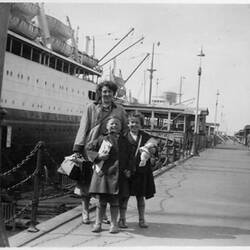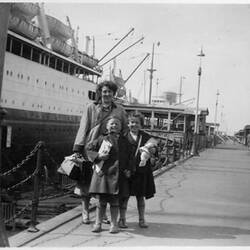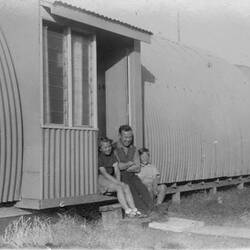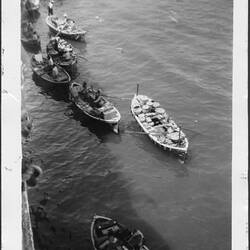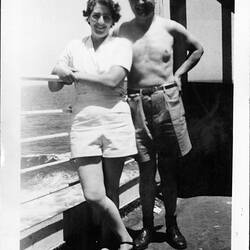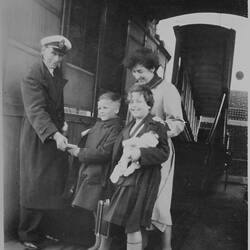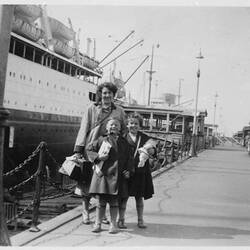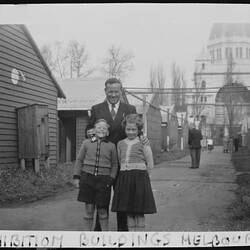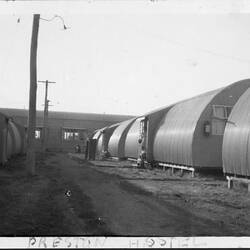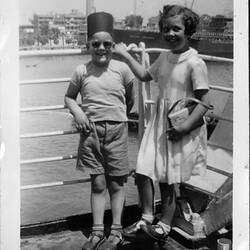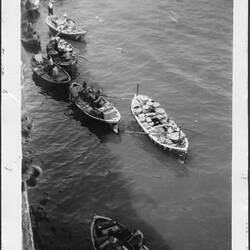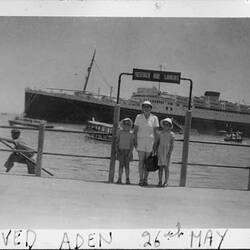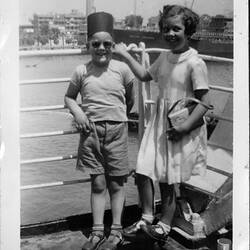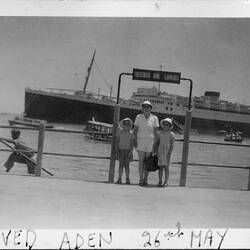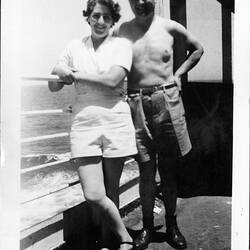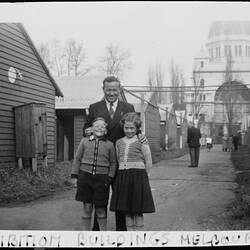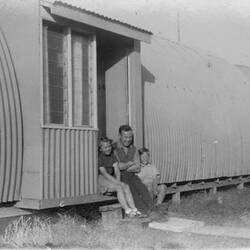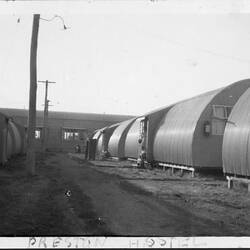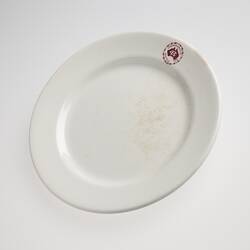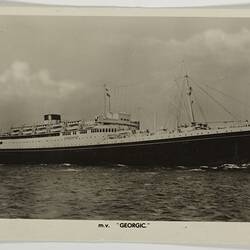Summary
On 13 May 1955 Joan and George Foster left England, with their two children June and Brian, for the promise of a new life in Australia. They travelled on the MV Georgic as '10 Pound Poms' arriving in Melbourne one month later. George pushed for the move to Australia and Joan didn't really want to come. The basic living conditions of their journey and Hostel accommodation, along with not knowing anyone made settling in Australia difficult for her. However as children are happy here she has no regrets.
Joan and George Foster (an ex-serviceman) and their two children June (aged 8) and Brian (aged 6) migrated to Melbourne from Ipswich, Suffolk in England in 1955. They were financially struggling after the war and were attracted to the warm climate, promise of work, space and opportunity (they believed) to grow their own food. In a cold war atmosphere they also thought they would be safer away from Europe and 'the war zone'.
They migrated as '10 Pound Poms' under an assisted passage scheme where adults were charged 10 pounds for their passage and children travelled for free. They left England on 13 May 1955 on the MV Georgic (an ex-troopship which only made a couple of voyages) travelling to Melbourne via Aden, the Suez Cannel, and Port Said.
They didn't bring many belongings with them but had a nest egg of 1,000 pounds from the sale of their house. As well as their cabin trunk, George built a crate for their belongings, which included blankets and a knitting machine, and another for their two bicycles. They were forced to pay 10 pounds dockside for the bicycle crate, which they hadn't expected and was about all the ready cash they had, but Joan managed to win it back on the ship in a game of 'housey housey'. Joan recalls their luggage was stencilled 'Com Nom Vic' (Commonwealth Nominated Victoria).
The family was in steerage, with George sleeping in men's quarters on one side of the ship and Joan and the children on the other. Joan recalls being seasick for much of the voyage (except for the Mediterranean) and the food being very ordinary. Some of the memorable events during their voyage were: when all the fathers banded together and accosted the captain demanding soft drinks for the children; the crew filling a canvas swimming pool for the children who were all holding up the sides, only to, in their excitement, all let go to jump in with water spilling everywhere; losing their son Brian for many hours to eventually find him under a lifeboat; the souvenir sellers at Port Said referring to passengers all as Mrs Simpson and Mr McGregor; and the process of putting money in a basket sent down the side of the ship to the floating markets and the goods being brought up. During the voyage the children brought a handbag and fez as souvenirs.
They arrived at Station Pier on 13 June 1955 on the Queen's Birthday and were sent to the migrant accommodation at the Exhibition Building where they stayed for about three days. Their accommodation consisted of a single room with four single beds. Prior to leaving England George had received a letter from Australia House, dated 5 May 1955, informing him that their hostel accommodation would not include a living room as previously indicated. From the Exhibition Building the family were moved by bus down Nicholson Street, along Bell Street to Water Street, an unmade road, to Preston Migrant Hostel where they stayed, with many other British migrants, from June 1955 to January 1956.
Living at the Hostel was quite basic and at the time Joan didn't know whether to laugh or cry about it. Their accommodation consisted of two bedrooms and a small central room with a table, a couple of kitchen chairs and one power point. Many paths were unmade and the communal showers and toilets were down the road and round the corner. The food was very ordinary consisting of tough steak, chops and some offal, with fish and chips on Fridays. The Hostel supplied only the basics: toilet rolls, blankets and crockery (which could only be used in the dining halls), and Joan regretted not bringing an electric jug.
George, a fitter and turner, was offered work at Robert Boddington's factory in Carlton where his name had been forwarded by colleagues in England. They were offering 15 pounds 10 shillings (a large increase on the 4 pounds he'd been earning in England) but George felt it wasn't enough to establish themselves. So the Immigration Department secured him work at the Vickers Ruwolt factory in Richmond where he worked for 3-4 years, cycling every day from Preston Migrant Hostel.
Joan approached CIG (Commonwealth Industrial Gases - now BOC, British Oxygen) in Bell Street, Preston for a job (unsuccessfully at first but on going to the SES discovered a job at CIG had just been posted so she raced back to secure it). She worked in their canteen for 26 ½ years, starting as a 'slushy' (washing dishes, serving clearing and preparing meals) and ending as assistant manager.
The children were bussed from the Hostel to school every day and Joan recalls the sectarian fighting between the children on the bus (there were many Irish Catholics at the Hostel). Joan also recalls watching the Olympic Village being built, as it was visible from the Hostel. During their six months at the Hostel, they saved a deposit for a house in Thornbury where they lived till 1982. George used the salvaged timber from their packing crates to make beds for the children when they moved to their new home.
George went on to Gordon Brothers Bakery in Brunswick, making new machinery and stayed there till he was too ill to work, sometime in the 1970s (he was diagnosed with leukaemia in 1969).
George passed away in 1979 and Joan has remarried twice since. George's sister, her husband and family migrated to Sydney in 1958.
It was George who originally pushed for the move to Australia, Joan didn't really want to come and found settling in Australia very difficult, not knowing anyone. But she says the children are happy so she has no regrets. She has also maintained contact with BOC through regular reunions.
More Information
-
Keywords
British Immigration, Assisted Immigration, Immigration, Immigrant Voyages, Immigrant Shipping, Ten Pound Tourists, Shipboard Travel, Migration & Settlement, Migrant Hostels, Migrant Reception Centres, Royal Exhibition Building: Migrant Reception Centre, Royal Exhibition Building
-
Authors
-
Article types
